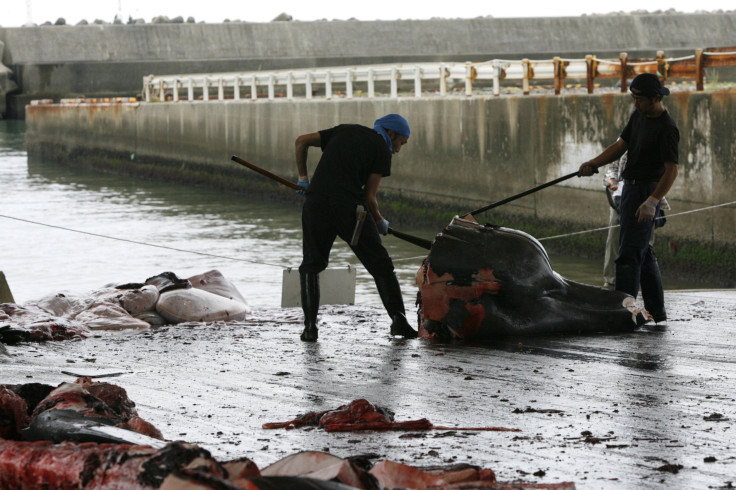Antarctic Whaling: Japan Seeks To Resume ‘Lethal Research’ Despite UN Ban On Whale Hunts

Japanese whalers will resume hunting minke whales in the Antarctic next year as part of a revised so-called scientific research program, the government announced Wednesday. Officials said Japan hopes to bypass a U.N. court ruling from earlier this year that temporarily suspended all Antarctic whaling.
The new whaling program will have a more scientific focus and will aim to "construct a model of the Antarctic Ocean ecosystem,” an official of the Japan Fisheries Agency told Agence France-Presse. "We are thinking that we will only target Antarctic minke whales in the new plan.”
The International Court of Justice, the 16-judge judicial arm of the United Nations, ruled in March that Japan’s whale slaughters in the Southern Ocean near Australia and New Zealand were not “for purposes of scientific research,” as Japanese officials have previously claimed. The decision came after Australian environmentalists filed a lawsuit with the U.N.’s highest court against Japan in 2010 over its whaling practices. The lawsuit alleged that Tokyo’s frequent whale expeditions were for commercial, not scientific, purposes, and that most of the whales’ meat was sold as food in shops and restaurants.
The U.N. ruling halted Japan’s 2014-2015 whale hunt season, but the Fisheries Agency says its new program addresses the problems cited in the decision. The agency has set a new catch target, taken two whale species – fin and humpbacks – off the menu, and will consider other methods of research, according to the Associated Press.
However, "collecting the necessary data requires lethal research, which was acknowledged in the [International Court of Justice] ruling," the agency official said. "We've yet to decide on the number of catch next year... We plan to submit the new plan to the [International Whaling Committee's] scientific committee for approval in October or November.”
Japan has long maintained that its actions are completely legal under maritime law. The government exploits a loophole in the 1982 agreement by members of the International Whaling Commission, established in 1946 to conserve global whale stocks, which put a moratorium on commercial whaling. The treaty took effect in 1986, but several nations, including Japan and Russia, opposed the moratorium and continued whaling.
The loophole allows for nations to hunt and kill whales for the purpose of scientific research. Japan claimed it was hunting thousands of whales a year for science, but most of the data collected has never been published in reputable scientific journals, according to New Zealand wildlife biologist C. George Miller. The few relevant scientific objectives Japanese researchers have pursued, such as whale population makeup, can be met with non-lethal research techniques like tagging and DNA profiling, Miller argues.
At the same time, Japanese consumers’ taste for whale meat is waning, according to a recent report from the Associated Press. Stockpiles of whale meat have doubled over the last 10 years; more than 2,300 minke whales worth of meat sits in freezers, according to the AP. Whale meat, once a cheap alternative protein source, is now about the same price as beef. Distributors of whale meat have said the high price and negative image have made it unappealing to consumers.
© Copyright IBTimes 2025. All rights reserved.






















